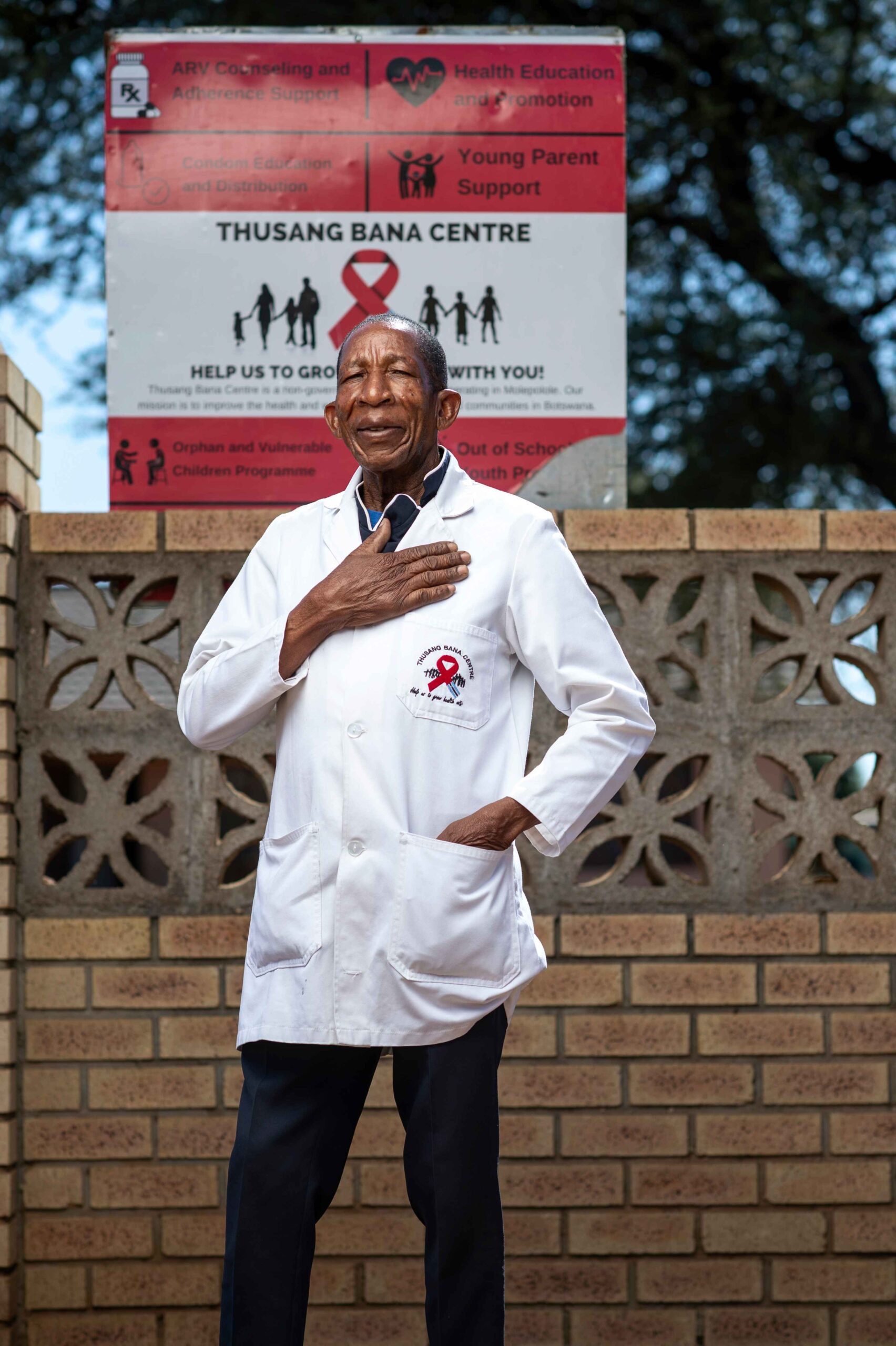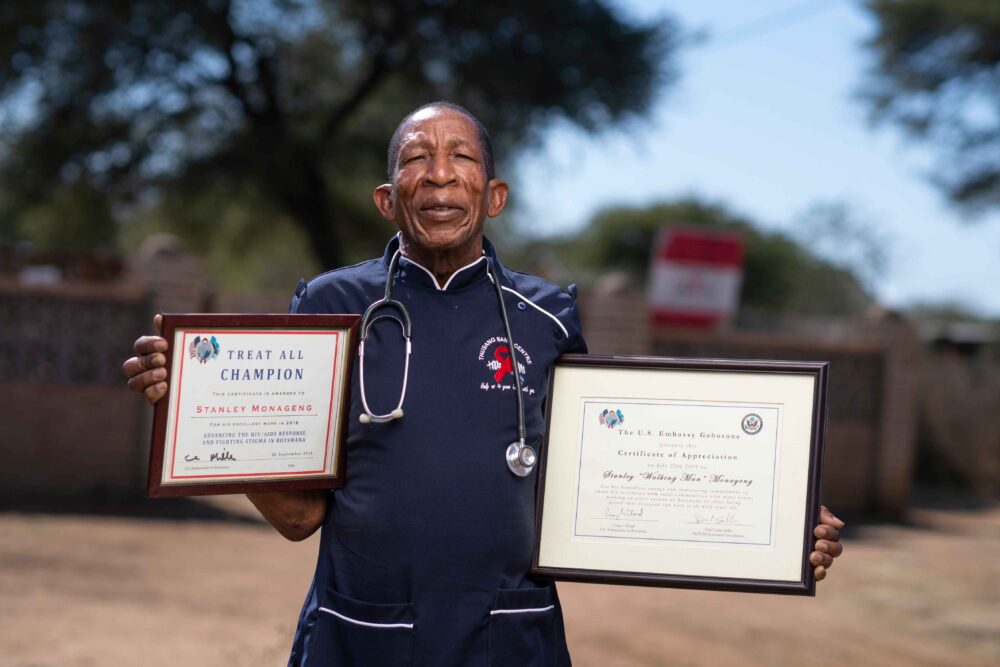Botswana’s constitution is conservative about access to healthcare; it does not include a provision on the right to healthcare and stipulates that other rights may be disregarded to protect public health. Civil society plays an important role in securing the right to healthcare in the country.
This is the first of a series of five inspirational individuals interviews and photoshoots from activists in Botswana, who have experienced the impact of IP on access to medicines and the consequences – for themselves and their communities.

© Letso Leipego/Majority World/Make Medicines Affordable/2021
BONELA (The Botswana Network on Ethics Law and HIV/AIDS) is an NGO seeks to integrate a human rights approach to the fight against HIV/AIDS to promote the greater right to health. The organization works closely with a human rights monitoring (HRM) unit which is for investigating human rights violations and developing strategies to address human rights violations in the context of HIV/AIDS. The HRM also investigates oppressive laws and policies.
BONEPWA (Botswana network of people living with HIV/AIDS) focuses on facilitating the formation of support groups for people living with HIV/AIDS, including projects seeking to ensure access to proper healthcare for people living with HIV/AIDS.
As the interviews will show, the first step towards improving access to medicines is sharing information on the importance on getting HIV treatment. NGO’s such as Thusang Bana Centre, led by Mr. Monageng was responsible for spreading information on HIV treatment to rural areas explaining how people could live with HIV.
On June 11th, 2021, Botswana’s President, Mokgweetsi Masisi, criticized high-income countries for hoarding COVID-19 vaccines, noting that they have acquired more than enough doses for their populations, while in most African countries, only two percent of the population has been fully vaccinated, and governments are struggling to secure vaccines. The president also called out pharmaceutical companies, asking them to share the technology needed to make the vaccines and voiced his support for the TRIPS waiver proposal that South Africa and India have brought to the World Trade Organization (WTO).
Mr. Stanley Monageng is the first to share his story:
Mr. Stanley Monageng, 75 years old and on antiretroviral therapy (ART)
since 2000.

© Letso Leipego/Majority World/Make Medicines Affordable/2021
“This all started as a flu, and I was advised to test for TB. After I did the test, I was diagnosed with TB and was on treatment for six months.”
“While being treated for TB, I continued to lose weight, and got bad body reactions. My doctor advised me to get an HIV test; unfortunately, I found out that I was HIV-positive. Back then, treatment was only available from private hospitals, and I had to pay for it with my own money – with difficulty. People did not do HIV testing this reason – because they could not afford the test or the treatment thereafter.”
“In 2003, the former President, Fetus Mogae, went to the USA to get help with providing HIV treatment. His visit was successful; since then, we can get HIV treatment from government health institutions.”
“I went through various medicines. They have changed a lot; I remember we used to take about 10 pills per day, and those were big pills to go down the throat with a lot of side effects, like getting sicker and hallucinations.
Finally, I found antiretrovirals (ARVs) that were compatible with my body, which I still use.”
“I learnt there is a huge gap in health education concerning HIV. That encouraged me to open my own NGO called ‘Thusang Bana Centre’ based in Molepolole, to spread the word around the country. We teach more about treatment and give health related programs in rural areas and towns. We carried the messages – ‘AIDS kills’, but if you get treatment, you will live longer.”
“During the journey, HIV ‘Treat-All’ was introduced, with only one pill that you take once a day, which I believe is more convenient. After ‘Treat-All’ was introduced, we made a documentary called ‘Have It All’, which was broadcast around the country. The main purpose a of this film was to fight stigma and give people general knowledge about HIV/AIDS.”
“I am a nurse by profession and had a bit of knowledge about this virus, which made it easier for me to accept myself. Telling my wife wasn’t much of challenge because she was also working in a health organization. The biggest challenge was telling my children, because back then there was a lot of stigma.”
“It took a bit of time for them to understand, but they accepted me at the end. It was mostly tougher with my last born because he was still in school. When I went public about my status, he faced more stigma at school; other students didn’t want to eat, sit or play next to him. I had to make him a T-shirt that read – ‘I am better, my father knows his HIV/AIDS status, what about your father’. I made him wear the T-shirt every day until it sank into everyone’s head, including parents and teachers, to reduce the stigma. It worked well for my son.”

© Letso Leipego/Majority World/Make Medicines Affordable/2021
In your opinion what has improved for people living with HIV/AIDS?
“Being able to take one pill per day, compared to the past when we used to take 10 pills per day. And being able to get treatment in one dispensary which helps in fighting discrimination against HIV.
In your opinion what needs to change for people living with HIV/AIDS?
People born with HIV face more difficulties because they take treatment without knowing the reasons why. When children learn that their treatment is for HIV/AIDS, it causes confusion, because they know they never had sexual intercourse. Usually after learning that they were born with HIV they start hating their parents and isolate, blaming their parents for not telling them that they live with HIV.
What needs to change in terms of giving knowledge to the people?
“The government must fully engage NGOs, because they are more effective in spreading information to the community and they usually work closely with them. Clinics and hospitals are always busy, so it makes it hard for them to go outside and give the right information and education to people.”
Any challenges with access?
“People in rural areas face more difficulties, because of distance and not having enough resources. The solution to this is still NGOs. The government should engage these organisations to bring ARVs to the people – this would stop them from going off of treatment and dying.”




